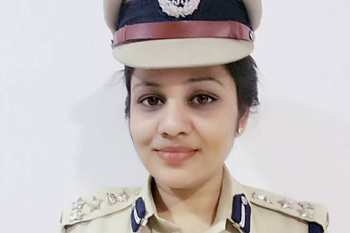Bengaluru, Jul 17: The Karnataka government transferred DIG (Prisons) D Roopa on Monday, days after the top cop exposed special treatment extended to AIADMK leader VK Sasikala at a Bengaluru prison.
“I haven’t received a copy of the notice. I will react after receiving the copy,” Roopa, who has been transferred to the traffic wing, told CNN-News18.
The senior IPS officer had submitted a report to her seniors last week in which she had alleged that Sasikala, convicted in a corruption case, was receiving VIP treatment, including a special kitchen counter.
Her report had led Karnataka Chief Minister Siddaramaiah to order a high-level inquiry. While her boss, DGP (Prisons) HSN Rao denied receiving such a report, Roopa had stood her ground.
She had received a notice from the state government for going to the media over her controversial report. As the report erupted into a major controversy, a red-faced government had asked her to explain her conduct, with Siddaramaiah saying it was "absolutely against the rule book”.
Denying that the move is a ‘punishment’ transfer, Karnataka Power Minister DK Shivakumar told CNN-News18, “We have some rules. An investigation is on. No officer is allowed to go to the media. A fair investigation will be conducted.”
In the report submitted, Roopa had alleged that there was "talk" that Rs 2 crore had exchanged hands to provide preferential treatment to Sasikala and even said there were allegations against HSN Rao as well. Rao, however, has rubbished Roopa's charge against him, terming it "absolutely false, baseless and wild”.
In her four-page report after visiting the central prison on July 10, Roopa had said a special kitchen was functioning in the jail here for Sasikala, a convict in a corruption case, in violation of the rules.
Sasikala has been lodged at the Parappana Agrahara central jail since her conviction in February in a disproportionate assets case along with her two relatives, VN Sudhakaran and Elavarasi, all serving a four-year jail term.
In the report, Roopa has also mentioned about the "preferential" treatment being provided to fake stamp paper scam kingpin Abdul Karim Telgi in the prison.
Undertrials in his cell are allegedly being used to do his personal work like massaging his shoulders, arms and legs.
Noting that six months ago there was a court direction to provide Telgi with assistants as he was using a wheelchair, the DIG in her report said though now he was not dependent on it and was walking properly, three to four undertrials are still allowed in his cell to do his work.




Comments
bitching letter
Shobakka.....enidakka......
This is a coward act by the govt., who are intolerance to minorities.
The man is really not terrorism, now actual terrorism is being created by the govt.
This will make the people to learn to more about Islam, where its teaching is 100% goes with science. Because it enjoys the status as divine message.
any way truth has to reign. People are wise they will decide what to accept what is the truth.
If not now sooner not too late.
who provides wrong information about her degree , bcom information & broadcast minister ! amazing ! oh my godse!!!
Add new comment